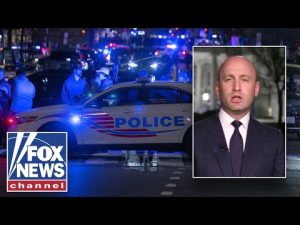Dave Rubin’s show recently circulated a direct-message clip that paints Zohran Mamdani not as a steadfast ideologue but as a candidate quietly recalculating the math behind his “free stuff” promises. The clip, shared widely on conservative channels, shows Rubin and his guests pressing Mamdani on how he’ll pay for sweeping giveaways and his responses read less like policy detail and more like fundraising theater.
Mamdani’s campaign platform is bold and unmistakable: a rent freeze for millions of rent-stabilized tenants, free city buses, city-owned grocery stores, universal childcare and a massive housing build-out. Those promises energized voters frustrated with runaway costs, but they also invited immediate scrutiny from analysts who pointed out glaring gaps between rhetoric and revenue.
The fiscal reality is brutal: independent estimates put the annual price tag for free buses alone in the hundreds of millions of dollars, and Mamdani proposes new taxes on the wealthy and corporations to bridge the gap. Even friendly coverage warns that the plan depends on Albany and a willingness to raise taxes or shift existing funds — all of which are politically and economically uncertain.
Signaling that the political wind is already changing, New York’s establishment has been forced into awkward conversations about feasibility — Governor Hochul publicly acknowledged talks with Mamdani’s team about the free-bus idea while stressing the state’s fiscal constraints. That kind of hand-holding from the power brokers is not reassuring; it looks like a scramble to paper over an expensive promise rather than a serious accounting of tradeoffs.
Conservative critics were right to warn that such sweeping, unfunded giveaways would chase capital and maintenance out of the city: landlords, developers and employers respond to incentives, and a regime of heavy-handed freezes and higher marginal taxes will discourage upkeep and new investment. The Guardian and other outlets have already noted opponents’ concerns that these policies could reduce housing quality and strain municipal services rather than deliver long-term affordability.
Rubin’s DM clip also underlines an ugly political truth: when lofty promises collide with reality, fundraising becomes the stopgap. Watching a candidate plead for cash while admitting uncertainty about implementation isn’t just theatre — it’s the moment populist rhetoric reveals its dependence on endless outside funding and political favors. That’s a rude awakening for anyone who thought “free” meant someone else wasn’t on the hook.
The takeaway for anyone who cares about honest governance is simple: demand specifics, not slogans. If a politician is promising to remake the budget and rewrite incentives across a city of eight million people, taxpayers deserve line-item math, independent audits and enforceable plans rather than vague boasts and viral videos.
New Yorkers—and indeed anyone watching big-city politics—should treat these developments as a cautionary tale: populist pledges sound great until the bill arrives, and the people who pay it are not faceless abstractions. Hold champions of sweeping, expensive programs accountable now, before wishful thinking becomes a fiscal crisis dressed up as generosity.







